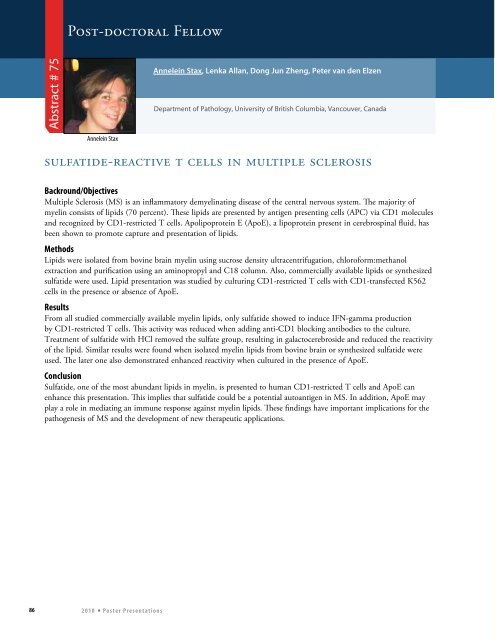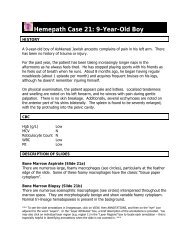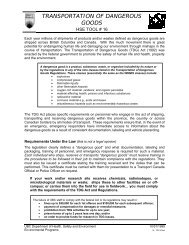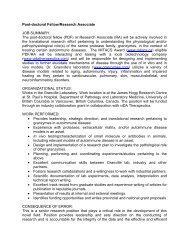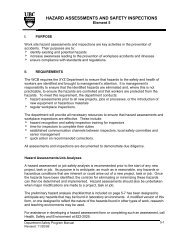Post-doctoral FellowAbstract # 75Annelein Stax, Lenka Allan, Dong Jun Zheng, Peter van den ElzenDepartment of <strong>Pathology</strong>, <strong>University</strong> of British Columbia, Vancouver, CanadaAnnelein Staxsulfatide-reactive t cells in multiple sclerosisBackround/ObjectivesMultiple Sclerosis (MS) is an inflammatory demyelinating disease of the central nervous system. The majority ofmyelin consists of lipids (70 percent). These lipids are presented by antigen presenting cells (APC) via CD1 molecules<strong>and</strong> recognized by CD1-restricted T cells. Apolipoprotein E (ApoE), a lipoprotein present in cerebrospinal fluid, hasbeen shown to promote capture <strong>and</strong> presentation of lipids.MethodsLipids were isolated from bovine brain myelin using sucrose density ultracentrifugation, chloroform:methanolextraction <strong>and</strong> purification using an aminopropyl <strong>and</strong> C18 column. Also, commercially available lipids or synthesizedsulfatide were used. Lipid presentation was studied by culturing CD1-restricted T cells with CD1-transfected K562cells in the presence or absence of ApoE.ResultsFrom all studied commercially available myelin lipids, only sulfatide showed to induce IFN-gamma productionby CD1-restricted T cells. This activity was reduced when adding anti-CD1 blocking antibodies to the culture.Treatment of sulfatide with HCl removed the sulfate group, resulting in galactocerebroside <strong>and</strong> reduced the reactivityof the lipid. Similar results were found when isolated myelin lipids from bovine brain or synthesized sulfatide wereused. The later one also demonstrated enhanced reactivity when cultured in the presence of ApoE.ConclusionSulfatide, one of the most abundant lipids in myelin, is presented to human CD1-restricted T cells <strong>and</strong> ApoE canenhance this presentation. This implies that sulfatide could be a potential autoantigen in MS. In addition, ApoE mayplay a role in mediating an immune response against myelin lipids. These findings have important implications for thepathogenesis of MS <strong>and</strong> the development of new therapeutic applications.86 2 0 1 0 * P o s t e r P r e s e n t a t i o n s
IndexAAbozina A. 45Abraham T. 55Allan L. 32, 84, 86Allard M. 29, 36, 37, 38, 39, 40, 44Al-Rawahi G. 80Al-Riyami A. 11Al-Sarraf A. 12, 51Anantha M. 42Andersen R. 30Anderson K. 53Andolfatto, G. 14Ang L. 29Aparicio S. 56Apel-Sarid L. 69BBaker M. 81Bally M. 42, 43Bashashat A. 26Baybik J. 18Bell L. 56Berean K. 53Bischoff L. 85Bleackle C. 29Boivin W. 28, 29, 55Bondy G. 44Book L. 80Bossé Y. 77Brooks D. 62Bryce E. 54Burgess B. 81Byrne A. 69CCarrier M. 56Carter I. 25Cetinbas N. 35Champagne S. 13Chari R. 65, 66, 67Chaworth-Musters T. 47Cheng J. 60, 71Cheng S. 72Chi K. 18Chin L. 77Chipperfield K. 11Chiu N. 58Choo J.R. 71Chow C. 71Chow E. 7 4Chow K. 56Chu F. 46Chung B.K. 32, 84Clarke B. 16Cochrane D. 69Constantinescu I. 63Côté H. 24, 45, 46, 47, 48DDai D. 22Dai L. 85Daley G. 20Dedhar S. 43DeValle N. 81Devlin A. 49Dunham C. 69Dunn S. 43EEinhorn W. 20Elliott W.M. 38El-Naggar A. 78Enfield K. 65FFawcett C. 75Forbes J. 47Frohlich J. 51Fung F. 18GGadawski I. 24, 48Gale N. 56Gao D. 17, 71Gao G. 62, 68Gardy J. 57Garmaroudi F. 26Garnis C. 52, 53Garratt J. 17Gazdar A. 65, 66Gelmon K. 43Gershom E. 73Gilks B. 16, 17, 56Glier M. 49Gosh S. 49Grant J. 54Granville D. 28, 29, 55Guns E. 58HHackett T. 77Hamilton J. 63Hamilton S. 74Hancock R. 62Haque M. 12Hardenberg G. 85Harris M. 24, 44Harvard C. 74, 75Hassal E. 19Hemida G. 82Hemida M. 27Hern<strong>and</strong>ez-Lee. J. 50Hiebert P. 55Hirsch-Reinshagen V. 81Hoang L. 70Holden J. 74, 75Holmes D. 21Hughes S. 52Hull M. 24Huntsman D. 15, 56, 57IImam T. 47, 48Innis S. 61JJanes K. 26, 61Jewell K. 57Jia W. 58Jitratkosol M. 24, 47Johns K. 44Joseph C. 60KKaliciak H. 59Kalloger S. 56Kalra J. 43Keller B. 60, 61Kelly N. 70Kennett J. 31Kindrachuk J. 62Kizhakkedathu J. 62, 63, 64Kyluik D. 83LLam L. 66Lam S. 65, 66Lam W. 31, 65, 67Lapointe N. 47Lau S. 71Lee A. 15Lee Carol 38Lee Charles 38Leung C. 36, 37, 38, 41Leung S. 17, 71Levings M. 23, 85Lewis M. 74Lewis S. 75Lichtenstein S. 39Liu X. 75
- Page 2:
PathDay: Keynote Speaker (4:30 pm)T
- Page 5:
Conference Outline2010abstract #14
- Page 9 and 10:
Table of Contentabstract #57 The ro
- Page 11 and 12:
ResidentClinical SciencesArwa Al-Ri
- Page 13 and 14:
ResidentTitus Wong 1 , Marc Romney,
- Page 17 and 18:
ResidentD. Turbin 1 , D. Gao 2 , J.
- Page 19 and 20:
ResidentDavid F Schaeffer 1 , Eric
- Page 21 and 22:
ResidentMajid Zolein 1 , Daniel T.
- Page 23 and 24:
Graduate StudentAshish K. Marwaha 1
- Page 25 and 26:
Graduate StudentAmanda Vanden Hoek
- Page 27 and 28:
Graduate StudentXin Ye 1 , Mary Zha
- Page 29:
Graduate StudentLisa S. Ang 1 , Sar
- Page 32 and 33:
Graduate StudentAbstract # 22Brian
- Page 36 and 37: OtherAbstract # 25Crystal Leung, Li
- Page 38 and 39: OtherAbstract # 27Lise Matzke 1 , W
- Page 40 and 41: Graduate StudentAbstract # 29Varun
- Page 42 and 43: Graduate StudentAbstract # 31Maite
- Page 44 and 45: Post-doctoral FellowAbstract # 33Ra
- Page 46 and 47: Graduate StudentAbstract # 35Hayley
- Page 48: Post-doctoral FellowAbstract # 37Es
- Page 51 and 52: ResidentAhmad Al-Sarraf MD 1, 2 , G
- Page 53 and 54: OtherRebecca Towle 1 , Danielle Mac
- Page 55 and 56: Graduate StudentPaul R. Hiebert 1,2
- Page 57 and 58: Graduate StudentV. Montoya 1 , J. G
- Page 59 and 60: OtherWalter Martz and Henry Kalicia
- Page 61 and 62: OtherKatelyn J. Janzen 1 , Elizabet
- Page 63 and 64: Graduate StudentJasmine L. Hamilton
- Page 65 and 66: Graduate StudentIan M. Wilson 1 , K
- Page 67 and 68: Graduate StudentKelsie L. Thu 1,3 ,
- Page 69 and 70: OtherLiat Apel-Sarid 1 , Doug Cochr
- Page 71 and 72: Graduate StudentJennifer R. Choo 1,
- Page 73 and 74: Graduate StudentEdwin S. Gershom 1
- Page 75 and 76: OtherYing Qiao 1, 2 , Chansonette H
- Page 77 and 78: Graduate StudentLeslie YM Chin 1,4
- Page 79 and 80: Graduate StudentBillie Velapatiño
- Page 81 and 82: Graduate StudentSophie Stukas 1 , S
- Page 83 and 84: Graduate StudentKyluik DL and Scott
- Page 85: Post-doctoral FellowJoel Montane 1
- Page 89: Ye X. 27, 82Yee S. 31Yoshida E. 12Y


